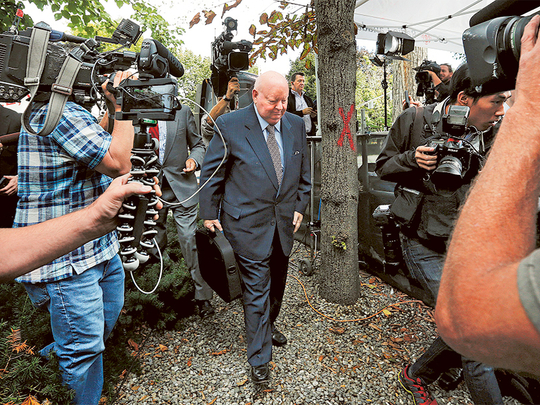
DUBAI
Two weeks ago, Canadian Prime minister Stephen Harper took the biggest gamble of his political career, deciding to pull the plug on his government and set a general election date on October 19 — an 11-week campaign that’s unprecedented in modern times.
Has that gamble paid off? According to a slew of opinion polls, the three main political parties are in a statistical dead heat.
With two months to go before the vote, Harper’s Conservatives at 31 per cent trail Thomas Mulcair’s NDP with 33 per cent support, said pollster Ipsos.
The Liberals, led by Justin Trudeau, the son of former longtime prime minister Pierre Trudeau, were third, with 29 per cent. But this was the only party to make gains since Ipsos’s last survey.
And over the past week, the campaign has been overshadowed by an embarrassing trial of a former senator, Mike Duffy, who was appointed to the upper house by Harper. Duffy is on trial for bribery and abusing expense claims and faces up to 14 years in prison if convicted.
Duffy had been outed by the media in late 2012 for claiming expenses for a cottage he owned on Prince Edward Island, while living in the capital Ottawa.
He insisted the expenses were legitimate but eventually agreed to repay them and in an interview with public broadcaster CBC said he had simply made a mistake in filling out “confusing” expense forms.
But the case has taken on deeper political overtones, with Harper’s then Chief of Staff, Nigel Wright, writing a cheque for C$90,000 (Dh250,000) to repay Duffy’s debts to the senate and make the whole scandal then go away.
It didn’t — and key testimony over the past week has focused on whether Harper knew about the payment and approved it.
As a star witness for the prosecution, Wright detailed how he had brokered a deal with Duffy to repay questionable expenses and make an embarrassing situation for the government go away — and then how everything fell apart.
Wright said he had previously sought Harper’s approval for committing the government to supporting Duffy’s spin on Senate spending in media interviews.
In an email entered into evidence, Wright wrote he was “good to go from the PM” on the deal, suggesting some input from Harper on the matter.
But he said “no” when asked if Harper was ever told about the C$90,000 payment.
On the campaign trail, Harper repeated that he did not know at the time about the monies Wright paid to Duffy, which some have suggested was hush money.
“You could not justify claiming expenses you did not actually incur — regardless of what the rules were,” Harper told reporters.
“Mr Wright was obviously speaking to Mr Duffy and had indicated to me that Mr Duffy would repay those expenses, which is exactly what Mr Duffy told the Canadian public,” he said.
But New Democrat and Liberal leaders insisted Harper appointed Duffy to the Senate and hired Wright.
“Nigel Wright might be on the witness stand, but it’s Harper who’s on trial,” Mulcair said.
While the amount of money is small — the timing of the trial couldn’t be worse. And it’s adding to a perception that Harper’s hand reaches into most facets of the Canadian federal government after nine years in power in Ottawa. He’s had a tempestuous relationship too with the Supreme Court of Canada. The Chief Justice, Beverley McLachlin, has clashed with Harper on several occasions, and brushed off criticisms on Thursday that her court has been too activist.
McLachlin, the court’s longest-serving chief justice, has presided over numerous decisions that reversed Parliament’s decisions, and made landmark rulings on prostitution and physician-assisted suicide that were opposed by the ruling Conservatives.
“We try to answer the questions put before us in accordance with the constitution and the law,” she said. “I leave the labels to other people.”
Harper’s Conservative government has also found itself at the losing end of decisions on mandatory minimum sentences and Senate reform. Last year, the court rejected one of Harper’s picks to fill a Supreme Court vacancy.
While Harper’s critics charge that he has been dismissive of the rule of law and the constitution, some social conservatives have argued McLachlin has gone to far in extending constitutional rights.
— With inputs from agencies












